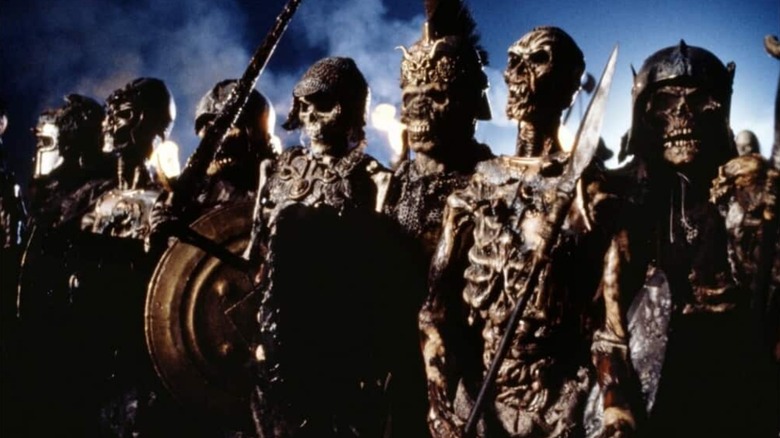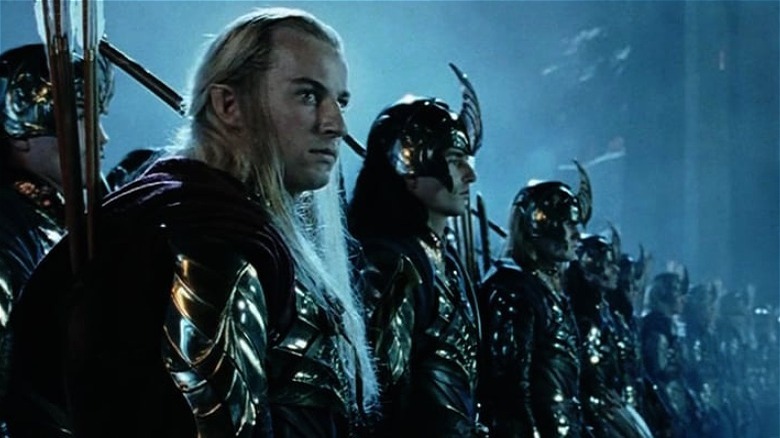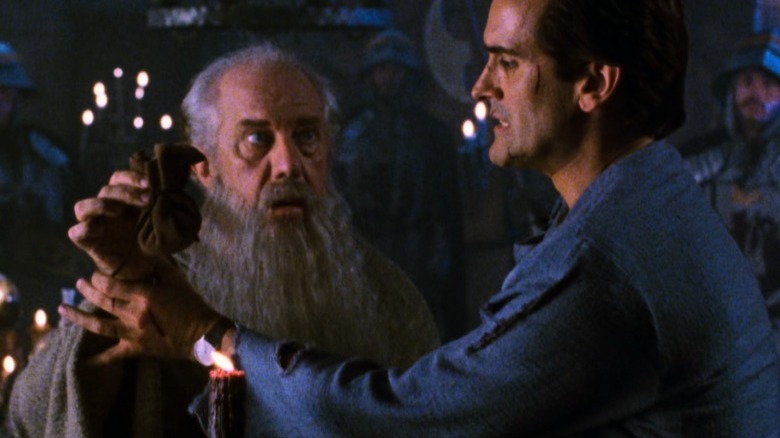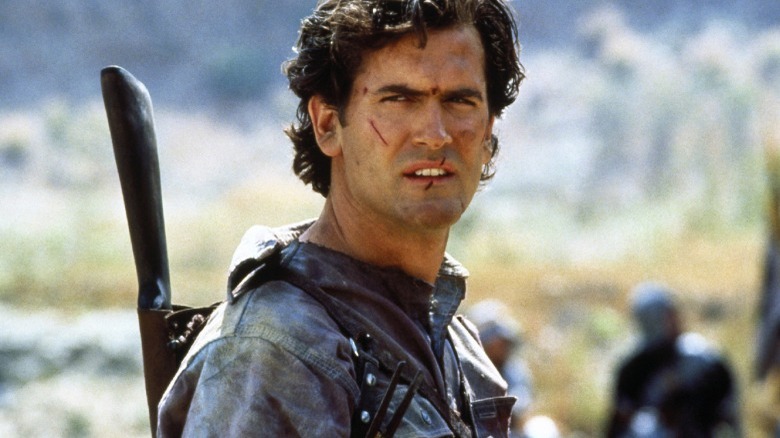The Unlikely Influence Sam Raimi's Army Of Darkness Had On Peter Jackson's Lord Of The Rings
As night falls, a castle needs to be protected from a massive army who have risen from the abyss to claim what they think is rightfully theirs. Archers stand by near the castle walls as the undead army marches toward the fortress in formation, while a reluctant hero rallies the men to fight against impossible odds. No, this is not the battle of Helm's Deep in Peter Jackson's "The Two Towers" — this sequence is the climactic battle between the skeletons and Arthur's men with Ash at the forefront in Sam Raimi's "Army of Darkness." The similarities between Raimi's audacious final installment in the "Evil Dead" trilogy and Jackson's near-perfect "The Lord of the Rings" trilogy are few far and between in terms of tone, intent, and cinematic ambition. However, in the event of the 30th anniversary of "Army of Darkness" this week, I would like to talk about the unlikely influence that Raimi's film had on certain aspects of Jackson's riveting saga.
"Army of Darkness" embraces a renegade brand of splatstick goofiness peppered throughout the first two "Evil Dead" installments by positioning Ash (Bruce Campbell) as an unconventional final survivor. Ash does not care about heroics, cannot remember quest specifics to save his life, and is mercilessly harassed by the skeletons when they rise. He can also be extremely self-centered and spineless when he wants to be, which is a part of Ash's natural evolution from an empathetic survivor to a hardened jerk over the years. Naturally, Raimi's central hero has little in common with the honorable, compassionate Aragorn (Viggo Mortensen), who plays a pivotal role in rallying men together to turn the tide at Helm's Deep. So why does this climactic battle in Jackson's film feel like a homage to the one in "Army of Darkness"?
The parallels between the two battles are uncanny
In "The Two Towers," the fate of Helm's Deep directly impacts the course of Middle-earth history with the destruction of Saruman's Uruk-hai, and the dawn of renewed alliance between the Elves and Men. This is a landmark moment in "The Lord of the Rings," painstakingly brought to life by Jackson and his crew with a combination of full-size physical models and computer-generated imagery. In contrast, the climactic final battle in "Army of Darkness" is significantly lesser in scale, but the stakes remain high in Raimi's bonkers, messed-up world: if these Deadites are not defeated, the world comes to an end. Although the skeleton army vs medieval dudes battle lies in a completely different tonal wheelhouse than the Battle of Helm's Deep, closer inspection makes it clear that Jackson took inspiration from Raimi's hilariously dizzying final battle.
The basic beats of the Helm's Deep battle are similar to the skeletal battle. For starters, in Raimi's sequence, fog and silence heighten the tension, while Jackson uses torrential rain, along with similar wide angles to the point that it feels like a subtle homage to Raimi's film. Moreover, the skeletons ramming a tree into the main gates to get to the Necronomicon is hilariously echoed when the Uruk-hai assault the main gateway to breach the fortress. There are smaller echoes here and there, including enemies being toppled over high walls, but these can be argued as delightfully coincidental.
Finally, while Raimi uses the trope of the enemy arriving last minute to save the day, Jackson ensures victory for the heroes by making Gandalf arrive with 2,000 riders led by Éomer. In both cases, this unexpected aid arrives at the brink of dawn, which essentially turns the tide and rekindles hope among all.
The devil's in the details
Ash is no self-sacrificing hero, but he manages to rouse Arthur's men before the battle, thanks to narcissistic cockiness and the pragmatic sense to form last-minute alliances. What happens next is interesting: after Ash shouts "Who's with me?," a bunch of Arthur's men respond in ways reminiscent of the "You have my sword...and you have my bow...and my axe!" sequence in "The Fellowship of the Ring." Here, some medieval dudes remark, "You can stand by my steel!" (said by Ted Raimi of all people) and "You can count on my axe!" but the essence of this scene seems to have trickled down into one of the most oft-quoted declarations from Jackson's first film in the trilogy. Whether intentional or not, I'll let you be the judge of that.
This brings me to my favorite detail from "Army of Darkness" which seems to have been consciously mirrored by Jackson in "The Two Towers." Remember when Saruman stops Wormtongue from blowing everyone up by pushing away a burning candle from a pestle full of gunpowder? This gag unfolds in a similar fashion in "Army of Darkness," where Ash prevents one of the wise men from holding a bag of gunpowder over an open flame and gently pushes it away. The play-by-play of this situation between Saruman and Wormtongue is too overt to be a coincidence, and considering that Jackson dipped his toes into splatter comedies prior to this with entries like "Dead Alive," Raimi's influence becomes hugely probable.
Army of Darkness rules to this day
While Raimi's influence on Jackson's "The Lord of the Rings" might've been in essence alone (where the parallels are simply supposed to be pure fun, and nothing more), the legacy of "Army of Darkness" still echoes through the chambers of slapstick comedy-horror. It is immensely rare for a film to pivot in tone and substance so hard and still fit in seamlessly with the cult franchise it is a part of. While the first two "Evil Dead" installments still manage to shock and traumatize amid its gags, "Army of Darkness" ramps up the fun to the max while drowning out aspects of real terror — it is an insane adventure helmed by a hero incapable of fulfilling traditional tropes of heroism.
A good example of how the film manages to entertain is the skeletal army battle that I discussed in detail above. As the skeletons are not real, macabre threats, the thrills stem from their comedic behavior, which includes them playing a bone flute as they march into battle while cackling and shouting "Death to the mortals!" as they charge forth. Rarely has a battle sequence without any serious intent or weight been so intentionally hilarious, to the point that you start rooting for the army of bags and bones, just to see what the heck could happen. Either way, it is fun to see the undead blown to bits and hurled up in the air along with a sack of gunpowder.
"Army of Darkness" also gave us "Hail to the king, baby!," the endlessly-quoted one-liner that caps off the theatrical ending, which plays out in a saccharine way as opposed to the scrapped downer ending. Irrespective of which version you prefer, Ash is a hilarious chainsaw-arm-wielding screw-up in all of them. Groovy.



